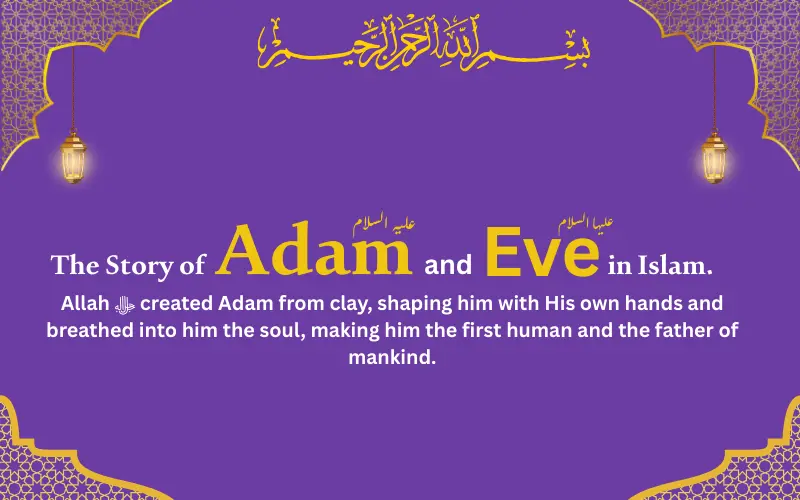The story of Adam (Ādam عليه السلام) and Eve (Ḥawwā’ عليها السلام) is the opening chapter of humanity’s existence, a chapter written not in the pages of human imagination, but in the eternal words of Allah ﷻ revealed in the Qur’an. It is a narrative that transcends time, culture, and geography, carrying profound lessons for every generation. In Islam, Adam is honored as the first human being and the first Prophet, created directly by Allah from clay, and Eve as his life partner, created to share in the blessings and trials of existence.
Unlike the versions preserved in other religious traditions, the Islamic account is free from notions of inherited sin and instead emphasizes human honor, moral responsibility, and divine mercy. Adam and Eve’s journey begins in Jannah (Paradise), a place of pure bliss, but it is not a static existence. It is a test; a test of obedience, trust, and the struggle against temptation.
When they falter, they are not condemned forever. Instead, they are shown the path of Tawbah (repentance), teaching mankind the most important truth: that every human being will make mistakes, but the doors of Allah’s mercy remain wide open for those who turn back to Him. Their story is not merely a tale of the past; it is our story. We are all the children of Adam and Eve, inheriting their legacy of choice, accountability, and hope.
In this blog, we will explore the Qur’anic narrative in detail, uncover the wisdom in the Hadith literature, and extract powerful life lessons from humanity’s first chapter, lessons that can guide us in our faith, relationships, and personal growth until the end of time.
1. The Creation of Adam
Allah ﷻ created Adam from clay, shaping him with His own hands, and breathed into him the soul, making him the first human and the father of mankind.
Qur’anic Reference: وَلَقَدْ خَلَقْنَا ٱلْإِنسَـٰنَ مِن صَلْصَـٰلٍۢ مِّنْ حَمَإٍۢ مَّسْنُونٍۢ
Thumma sawwāhu wa nafakha fīhi min rūḥihi
Translation: “We created man from sounding clay, from mud molded into shape. Then He proportioned him and breathed into him of His Spirit.” (Surah Al-Hijr 15:26, 29)
This Qur’anic verse from Surah Al-Hijr (15:26, 29) offers a profound insight into the origin and honor of humanity in Islam. Allah ﷻ informs us that mankind was created from ṣalṣāl, sounding clay, shaped from ḥama’in masnūn, a specially formed dark mud, signifying both the humble physical origin of man and the deliberate, precise act of creation. But it was not the clay alone that made Adam عليه السلام special; it was when Allah “proportioned him and breathed into him of His Spirit” that humanity gained its unique status among all creation. This divine breath symbolizes the soul, the consciousness, and the moral responsibility entrusted to every human being. The verse not only reminds us of our humble beginnings but also of our noble purpose, urging us to live as beings honored by Allah, yet ever aware of our dependence on Him.
2. The Creation of Eve (Ḥawwā’) and Their Life in Paradise
Eve was created from Adam as his companion. Both were placed in Jannah (Paradise) with the freedom to enjoy its blessings, except for one specific tree they were commanded not to approach.
Qur’anic Reference: يَـٰٓـَٔادَمُ ٱسْكُنْ أَنتَ وَزَوْجُكَ ٱلْجَنَّةَ وَكُلَا مِنْهَا رَغَدًا حَيْثُ شِئْتُمَا
Transliteration: Yā Ādamu oskun anta wa zawjuka al-jannata wa kulā minhā raghadan ḥaythu shi’tumā
Translation: “O Adam, dwell, you and your wife, in Paradise and eat from it in abundance wherever you will…” (Surah Al-Baqarah 2:35)
In Surah Al-Baqarah (2:35), Allah ﷻ addresses Adam عليه السلام with an invitation full of honor, comfort, and generosity: “O Adam, dwell, you and your wife, in Paradise and eat from it in abundance wherever you will.” This verse captures the initial state of humanity; one of peace, provision, and direct closeness to the Creator. Adam and Ḥawwā’ عليها السلام were placed in Jannah, a realm free from hardship, where sustenance was plentiful and unrestricted. This divine command reflects Allah’s mercy in granting them not only a place of dwelling but also the freedom to enjoy its blessings without fear or toil. At the same time, it sets the stage for the test of obedience that would follow, reminding us that even in times of ease, faithfulness to Allah’s guidance remains our greatest responsibility.
3. The Temptation and Disobedience
Shayṭān (Satan), out of jealousy, deceived Adam and Eve into eating from the forbidden tree, causing them to lose their place in Paradise.
Qur’anic Reference: فَأَزَلَّهُمَا ٱلشَّيْطَـٰنُ عَنْهَا فَأَخْرَجَهُمَا مِمَّا كَانَا فِيهِ
Transliteration: Fa-azallahumā al-shayṭānu ‘anhā fa-akhrajahumā mimmā kānā fīh
Translation: “But Satan caused them to slip out of it and removed them from that [condition] in which they had been.” (Surah Al-Baqarah 2:36)
In Surah Al-Baqarah (2:36), Allah ﷻ reveals the pivotal turning point in humanity’s first chapter: “But Satan caused them to slip out of it and removed them from that [condition] in which they had been.” Despite the abundance and comfort of Paradise, Adam عليه السلام and Ḥawwā’ عليها السلام were vulnerable to the deception of Shayṭān, whose jealousy and arrogance drove him to mislead them. The word “azallahumā” (caused them to slip) conveys that this was not an outright rejection of Allah’s command, but a momentary lapse influenced by temptation. The result, however, was significant, they lost their state of ease and were sent to live on earth, where struggle, effort, and moral tests would define human life. This verse serves as a timeless warning that Satan’s whispers are subtle yet dangerous, and that complacency in faith can lead to spiritual downfall even in the most blessed circumstances.
4. Repentance and Allah’s Mercy
Unlike the concept of original sin, Islam teaches that Adam and Eve repented sincerely and Allah forgave them.
Qur’anic Reference: فَتَلَقَّىٰٓ ءَادَمُ مِن رَّبِّهِۦ كَلِمَـٰتٍۢ فَتَابَ عَلَيْهِ
Transliteration: Fataallaqā Ādamu min rabbihi kalimātin fatāba ‘alayh
Translation: “Then Adam received from his Lord words [of inspiration], and He accepted his repentance.” (Surah Al-Baqarah 2:37)
In Surah Al-Baqarah (2:37), Allah ﷻ shifts the tone from loss to hope: “Then Adam received from his Lord words [of inspiration], and He accepted his repentance.” After the mistake that led to their departure from Paradise, Adam عليه السلام was not abandoned in shame; instead, Allah taught him the exact words to seek forgiveness, showing that repentance itself is a gift from the Creator. The phrase “fatāba ‘alayh” emphasizes that Allah not only accepted Adam’s repentance but turned towards him in mercy, restoring his dignity and spiritual standing. This verse beautifully illustrates that in Islam, sins are not the end of the story, sincere repentance wipes them away, and Allah’s mercy is always greater than our mistakes. It is a timeless reminder that no matter how far we slip, the path back to Allah is never closed.
Hadith Reference:
The Prophet ﷺ said: خَلَقَ اللهُ آدَمَ على صورته، وطوله ستون ذراعاً
Transliteration: Khalaqallāhu Ādama ‘alā ṣūratihi, wa ṭūluhu sittūna dhirā‘an
Translation: “Allah created Adam in His image, and his height was sixty cubits.” (Sahih al-Bukhari, Sahih Muslim)
5. Lessons for Humanity
The story of Adam and Eve in Islam carries timeless wisdom:
- Human Dignity – We are honored creations of Allah.
- Free Will and Responsibility – Our choices shape our destiny.
- The Danger of Arrogance – Shayṭān’s pride led to his downfall.
- Repentance Brings Hope – No sin is too great for Allah’s mercy.
- Unity of Humanity – We are all children of Adam and Eve.
Qur’anic Reminder:
يَـٰٓأَيُّهَا ٱلنَّاسُ ٱتَّقُوا۟ رَبَّكُمُ ٱلَّذِى خَلَقَكُم مِّن نَّفْسٍۢ وَٰحِدَةٍۢ
Transliteration: Yā ayyuhā al-nāsu ittaqū rabbakumu alladhī khalaqakum min nafsin wāḥidah
Translation: “O mankind, fear your Lord, who created you from one soul…” (Surah An-Nisā’ 4:1)
In Surah An-Nisā’ (4:1), Allah ﷻ calls upon all of humanity with a universal reminder: “O mankind, fear your Lord, who created you from one soul…” This verse highlights our shared origin from a single human, Adam عليه السلام, underscoring the unity and equality of all people. It reminds us that regardless of race, status, or culture, we are one family before Allah and are bound by the same duty of taqwa; conscious awareness and obedience to our Creator.
Conclusion
The Islamic story of Adam and Eve is not a tale of eternal condemnation but a story of hope, mercy, and the human journey. It teaches us that disobedience can be forgiven with sincere repentance, that pride leads to downfall, and that our true success lies in obedience to Allah. From the first human breath to the last Day, their story continues to shape our understanding of life, morality, and our relationship with the Creator.
Final Reminder from the Prophet ﷺ:
كُلُّ بَنِي آدَمَ خَطَّاءٌ وَخَيْرُ الخَطَّائِينَ التَّوَّابُونَ
Transliteration: Kullu banī Ādama khaṭṭā’, wa khayru al-khaṭṭā’īna al-tawwābūn
Translation: “All the children of Adam are sinners, and the best of sinners are those who repent often.” (Sunan al-Tirmidhi, Hasan)
*If you found this article beneficial, please share it with others so they too can gain clarity on this important topic in Islam.







18 Responses
I just wanted to drop by and say how much I appreciate your blog. Your writing style is both engaging and informative, making it a pleasure to read. Looking forward to your future posts!
Hello my loved one I want to say that this post is amazing great written and include almost all significant infos I would like to look extra posts like this
Your blog is a beacon of light in the often murky waters of online content. Your thoughtful analysis and insightful commentary never fail to leave a lasting impression. Keep up the amazing work!
Your blog is like a beacon of light in the vast expanse of the internet. Your thoughtful analysis and insightful commentary never fail to leave a lasting impression. Thank you for all that you do.
Your writing is not only informative but also incredibly inspiring. You have a knack for sparking curiosity and encouraging critical thinking. Thank you for being such a positive influence!
Hey there You have done a fantastic job I will certainly digg it and personally recommend to my friends Im confident theyll be benefited from this site
Your blog has quickly become one of my favorites. Your writing is both insightful and thought-provoking, and I always come away from your posts feeling inspired. Keep up the phenomenal work!
Fantastic site Lots of helpful information here I am sending it to some friends ans additionally sharing in delicious And of course thanks for your effort
Thank you for the auspicious writeup It in fact was a amusement account it Look advanced to more added agreeable from you By the way how could we communicate
Fantastic site Lots of helpful information here I am sending it to some friends ans additionally sharing in delicious And of course thanks for your effort
Your blog is a true hidden gem on the internet. Your thoughtful analysis and engaging writing style set you apart from the crowd. Keep up the excellent work!
Your blog is a testament to your passion for your subject matter. Your enthusiasm is infectious, and it’s clear that you put your heart and soul into every post. Keep up the fantastic work!
Fantastic site Lots of helpful information here I am sending it to some friends ans additionally sharing in delicious And of course thanks for your effort
Your passion for your subject matter shines through in every post. It’s clear that you genuinely care about sharing knowledge and making a positive impact on your readers. Kudos to you!
Its like you read my mind You appear to know so much about this like you wrote the book in it or something I think that you can do with a few pics to drive the message home a little bit but other than that this is fantastic blog A great read Ill certainly be back
Your writing has a way of resonating with me on a deep level. I appreciate the honesty and authenticity you bring to every post. Thank you for sharing your journey with us.
Wonderful work! This is the kind of info that are supposed to be shared around the web. Thank you =)
Great information in the article